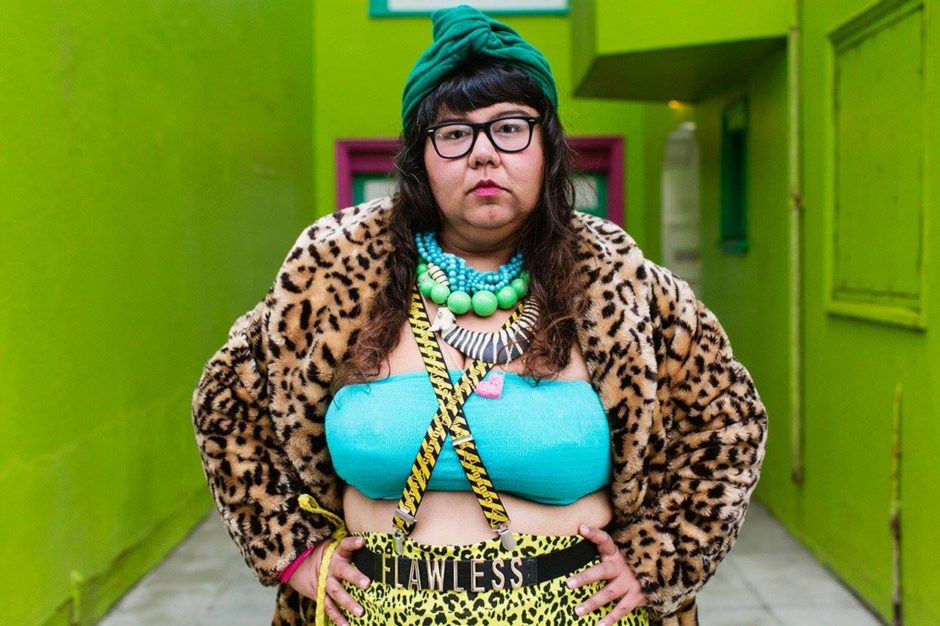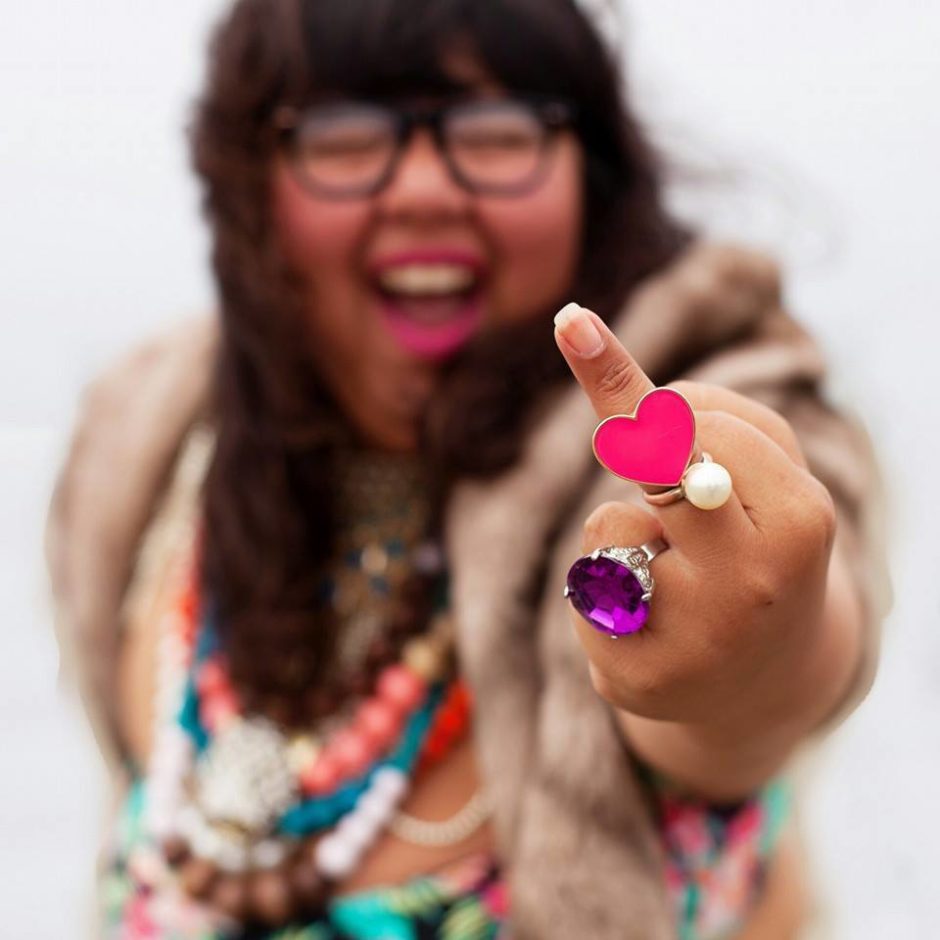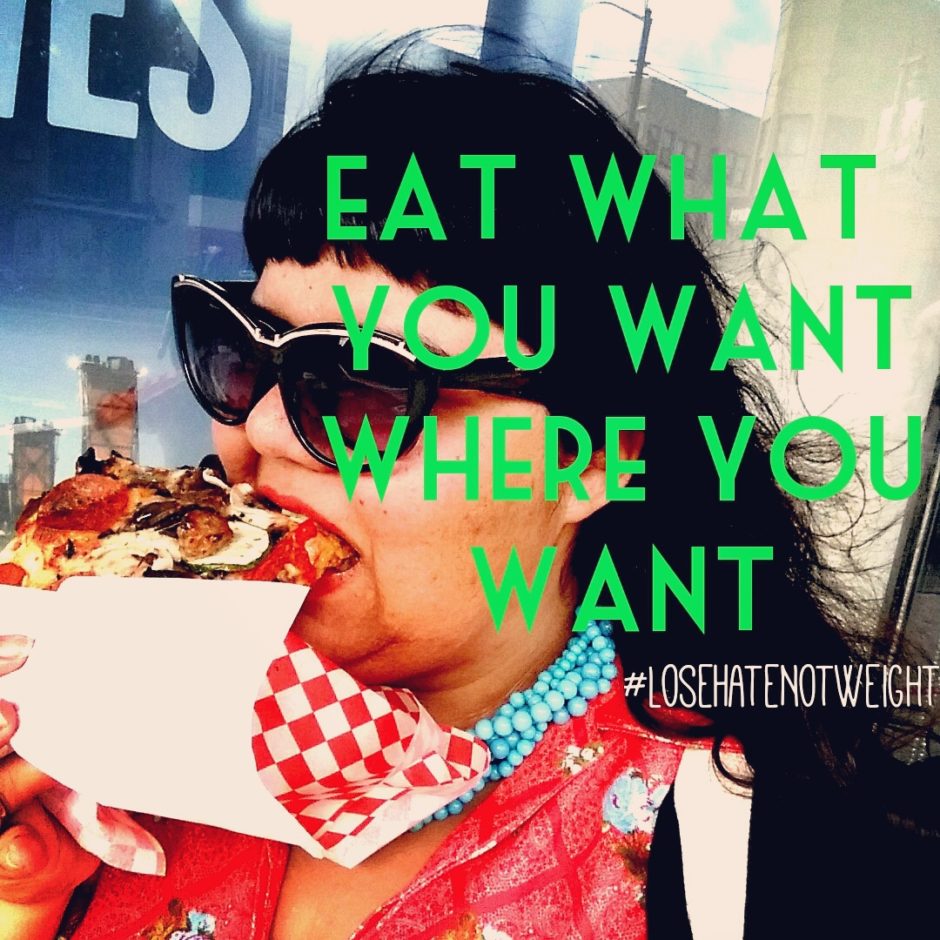Hello darlings! I have a special treat for readers of cripconfessions – an interview with Virgie Tovar! If you haven’t heard, Virgie is one of THE fiercest Fat, racial justice, reproductive justice, anti-homo/transphobic, feminist revolutionaries you will ever have the pleasure of knowing. Join her and other radical beauties at Babecamp this November as you learn how to break from diet culture. Watching Virgie publicly express love to her body through daily affirmations via posting vibrant selfies, she implores us all: wear what we want, eat what we want, and simply live life with pride as much as we can. This visual representation alone provides a powerful antidote to the relentless cultural message telling us that we can’t do or say X or Y because of our size, race, gender, penchant for animal print leggings, belief that we are a mermaids, etc. Enjoy! <3
Though this interview was completed in 2014 and not posted until 2 years later (due to ‘crip time’ issues: check out disability studies scholars Alison Kafer or Ellen Samuels’ work on the subject), Virgie states that her thoughts are similar and that she continues fostering embracing Fat bodies, and tools to give up on diet culture. I look to the work (e.g., organizing, writing, art) of leaders like Virgie to see what methods are working in other marginalized communities, and for any connections among identities. Understanding the places where our issues overlap/interlock opens up space to discuss common strategies to resist and dismantle power.
Enjoy! @disaBethany <3

CC: Aside from a sexy writer and speaker spreading the good word of embracing your body and sexuality at any size, you are a fellow graduate of the Human Sexuality Studies Department at San Francisco State University (where I went to “sex school” – SF truly is a fabulous city to study sexuality). Much love to sex comrades! How do you think the degree influenced and helped you along your professional path?
VT: I came to feminism through sex positivity. My very first lessons in relinquishing the shame I had for my fat body came through learning how ashamed I was of my sexuality. Though I had intended to study the sex lives of fat women in grad school, my research ended up being focused on the intersections of gender race and size. My advisor even said my ultimate project wasn’t really an explicitly sexuality studies thesis. So beside my apparent confusion, I think the reality is that sexuality touches on so many aspects of our lives. I started with an interest in sexuality and ended up building a career as a body image expert/scholar and author who does Fat Studies.
Very few people pursue sexuality academically and I think the degree sets me apart in that way. Furthermore, about half of my requests for lectures at universities have a sexuality component. I primarily work with undergraduates and at that stage in their lives they are making a lot of decisions about their sex lives and exploring their sexual preferences and desires. To be able to address those things frankly in lectures that are also about body image and social justice feels really powerful. I think they deeply crave that kind of intersectional approach. Because they aren’t JUST dealing with, for example, negotiating for the kind of sex they want. They’re ALSO potentially dealing with shame around their body or concerns about how racism affects their dating experiences, etc.
The Sexuality Studies program at SFSU takes a social science approach to research and also dealt with sexuality quite theoretically. Honestly I went into grad school absolutely HATING theory and feeling that deconstruction was totally bourgeois. And I left grad school OBSESSED (like hard core addicted to) theory. That deeply influences my work. I never intended to be a theorist but I am. I think there were many unintended lessons – frankly, many of them negative – I received in learning to navigate academia that have influenced me and my career trajectory as well. I actually speak frankly and extensively about that experience in a new book edited by a young activist named Nia King. The book is called Queer & Trans Artists of Color: Stories of Some of Our Lives.
CC: You have a published a book, write for popular blogs and post a lot of selfies in some of the most amazing fashion!! What keeps you passionately working
VT: Y’know, pissing off patriarchy is its own reward, Bethany! My selfies totally stick it to The Man. My book Hot & Heavy: Fierce Fat Girls on Life, Love and Fashion and blogging totally destabilize racism and fatphobia. My refusal to live a life of fat shame is my way of refusing to be invisible. My choice to stop dieting and to be fat are my way of refusing to be obedient. My fatkini is a call to arms. I wear neon pink mini-skirts and crop tops because those things make me happy and I document them through photography and writing because they represent an aggressive message about my refusal to hate this body or give into the cultural expectation that I hide it. Living a life based in self love is so FUN and enlivening. It’s like I have found this amazing thing that I want to share with other people. I have found a way to survive and own the experiences of discrimination and bigotry that have harmed me.
I have the privilege of an excellent education and I have the privilege of resilience that comes from growing up brown, fat and working class. Consequently I take my working class woman of color aesthetics with me into classrooms and academic journals, to blogs and Instagram. I mix those aesthetics and my personal experiences with high theory and critical analysis. I know the gnarly shit that exists at the core of institutions like fatphobia and it’s my job to use the advantages I have to spread the word of a new way of life that is available to people if they want it.
CC: What advice do you want to share with young people, who are often socially shamed because of their bodily differences, to acknowledging and appreciating their inner beauty? And – what is THE fashion tip every diva (of any gender!) needs to know?
VT: Being young is super harsh. I wish I knew about body positivity and fat politics when I was young but I don’t know how I would have implemented them in an awful environment like high school. What the public health sector has essentially done is deputize everyone in our society as honorary members of the fat hate police. It’s super gross and kids are already dealing with goddamn sociopaths on the regular, especially fat/queer/gender non-conforming/disabled/poor kids.
VT: My words of wisdom are:
You deserve better.
Snitch on assholes ALL THE TIME.
You have the right to defend your body.
Don’t be “the better person.” That’s some assimilation rhetoric right there. Be totally petulant and rude all the time when faced with discrimination and bigotry.
Wear whatever you want.
It’s normal to feel hurt but don’t feel shame or failure. Practice remembering that there is nothing wrong with you. The attitudes you are experiencing are symptomatic of larger social problems. That anyone feels they have the right to comment on your body is a larger commentary on them as a person and the culture as an agent of poor social mores. It is not a commentary on something wrong with you.
Remember that people who are mean are super hurt and sad people. Again, no need to feel sorry for an asshole but sometimes it’s important for me to remember that hurt people hurt people.
Value the people who make up your community and nourish and defend each other.
CC: THE fashion tip:
VT: That’s a lot of pressure but I would say: wear what makes you feel powerful.
CC: What are the most common microaggressions you experience?
VT: I wouldn’t necessarily call it a microaggression but as a fat brown woman I am constantly anticipating people saying things about my body in public, especially when I’m out with friends and my boyfriend. This erodes at my mental health and is really emotionally draining. Some people try to diminish this experience by saying that I am “perceiving” discrimination where there may not be. Damn right I’m perceiving it! I have been taught that just walking around in my fat body makes people angry and hostile. So even when it is not “happening” I am thinking about how to take care of myself when it does. People comment on my body often enough that it is absolutely an inevitability in my mind. This is part of what it means to be in a marginalized position culturally. To be constantly aware that you are in that position and that people will feel entitled to comment on you or treat you poorly.

CC: What is your favorite mode of resistance and/or response to the microaggressors? How often do you respond to the microaggressions on the spot
VT: I often respond to people’s microaggressions and outright aggressions on the spot. I would say “usually,” actually. I often say something condescending, in which they are positioned as the rude and retrograde one. Because people presume that all fat women are ashamed of their bodies and that we are also dumb, they are usually literally SHOCKED when I throw out some pseudo intellectual (or outright highly theoretical) stuff in response to their ridiculous behavior. Because the abuse I experience is layered (I am interfacing often with not only fatphobia but also sexism and racism), I will sometimes just call out the racist or sexist nature of someone’s behavior. A woman on a commuter train in San Francisco once came up to me and tried to police my outfit. I tried to ignore her because I knew she couldn’t handle the shit storm that was going to be rained upon her if she got me started. But she was not to be deterred. Finally I said “Do you as a white woman feel you can say whatever you want to me?” She was *literally* flabergasted. It was amazing. Upon recovering from the rhetorical question, she made her next tactical error by proceeding to go the tired route of positing that *I* was in fact the racist for noticing that *she* was white. I then proceeded to just let that lady have it: “I don’t think you understand the theoretical framework of racism. It is uni- directional.” Ooh that REALLY pissed her off. An uppity brown girl reading her. I proceeded to yell “YOU’RE A RACIST” over and over until she left the train.
I am not afraid to own the fact that the gloves are off when you attack me. I can be a horrific and terrifying femme. I identify as a bitch. If you’re dumb enough to be a bigot publicly you clearly need some schooling and I’m delighted to give you a free day pass to Virgie’s Bitch Academy.
I am trying to master the art of laughing and pointing at people who are bigots. I have gotten really good at staring to the point of their discomfort. Another thing I LOVE that is super easy and almost effortless is that I take out my phone and start recording them with my camera. It is a very uncomfortable experience for them when I turn the gaze on them.
Deep thoughts: Stew on that hearty wisdom, folks! I would love to know what resonated with you from the talk with Virgie? How can Fat and disabled communities support one another? And who you’d like me to talk to next, introductions are welcomed and appreciated!
Let me know what’s on your mind: @disaBethany

To speak to Virgie, please use the following:
Instagram: @virgietovar
Twitter: @virgietovar
Hashtag: #LoseHateNotWeight
Website:www.virgietovar.com
Dear Virgie: http://wearyourvoicemag.com/tag/virgie-tovar
I book keynotes through:virgie@virgietovar.com
And Abundia, a retreat for women of size (link:www.abundia.org)
See more events at www.virgietovar.com/calendar

